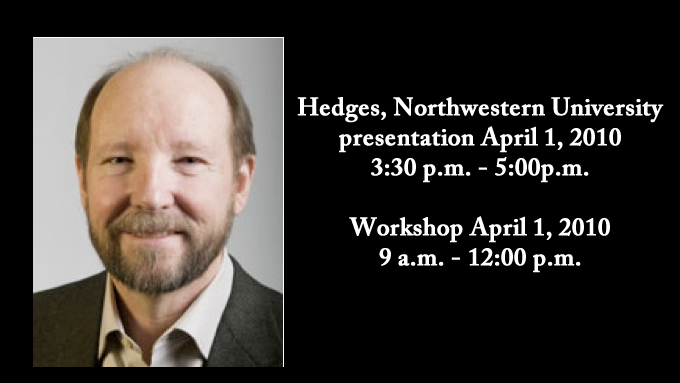
Hedges offers workshop April 1, 2010 followed by colloquium
25 Mar 2010
Workshop, 9:00 a.m. - 12:00 p.m.The workshop will be a brief introduction to the planning and analysis of randomized trials focusing on the two most widely used classes of designs: a) hierarchical (nested or cluster-randomized) designs, and b) randomized block (matched) designs. Dr. Hedges will start with an introduction to experimentation and the special difficulties that arise in experimentation in social settings (like schools), relating this to well known (cluster) sampling models typically used in social and educational settings. He will then move to the comparative advantages and weaknesses of the various experimental designs, power and precision computations, the role and impact of covariates, blocking as an adjunct or alternative to covariate adjustment, and finding optimal designs (that is, designs with highest precision and power for a given cost). Practical considerations in running randomized trials will be discussed such as insuring continuing cooperation, dealing with attrition, and making inferences about the effect of treatment on the treated as opposed to those assigned to treatment (the intent to treat issue). Dr. Hedges will end with a discussion of how to think about generalization from experiments about treatment effects in larger populations. This workshop is intended to be interactive, using a combination of real and hypothetical examples to illustrate principles.
Talk, 3:30 p.m. - 5:00 p.m.
Dr. Hedges will present a general introduction to randomized trials in the social and behavioral sciences. After establishing a brief history and rationale, he will raise potential ethical issues in using randomization in social and education studies, illustrating the sampling issues that make social and education experiments more challenging than laboratory experiments. Designs that have been most frequently used in large scale educational and social experiments will be discussed as well as examples of each. Finally, the statistical and practical problems of conducting trials in the behavioral sciences will be discussed along with a comparison of the difficulties faced when conducting large scale experiments versus large scale quasi-experiments that might have comparable validity.
Dr. Larry Hedges is Board of Trustees Professor of Statistics and Social Policy and Faculty Fellow in the Institute for Policy Research at Northwestern University. Professor Hedges’ research interests are in the development and application of statistical methods for the social, medical, and biological sciences. One major interest is the combination of results across studies to draw general conclusions (meta-analysis). Another major area of research is the design and analysis of social experiments.
College of Education and Human Sciences